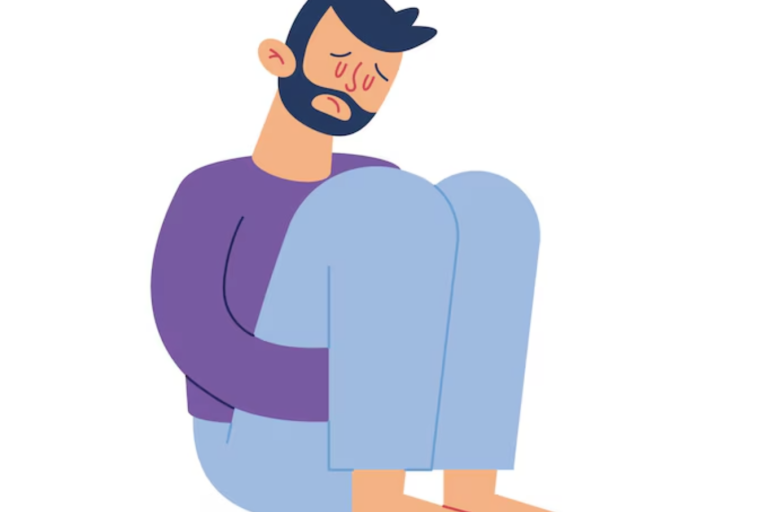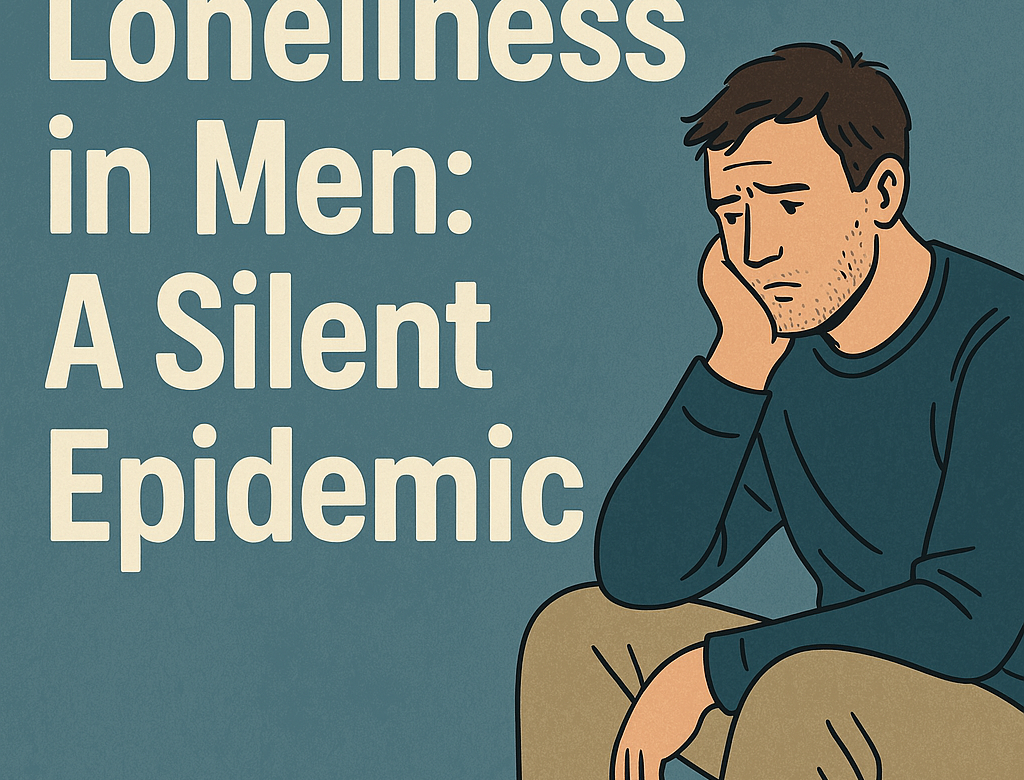Loneliness is one of the most profound emotional challenges men face today. Beneath the surface of strength, independence, and stoicism, many men carry a quiet ache for deeper connection. Often misunderstood or minimized, loneliness can deeply affect mental and physical health, influencing everything from emotional resilience to immune function and sleep quality.
At Counselling and Psychotherapy Services for Men in Sydney, Christian Acuña sees firsthand how isolation impacts men across all ages. Whether it stems from childhood emotional neglect, recent relationship breakdowns, or a lifetime of unspoken pain, loneliness has a way of echoing through the nervous system, shaping the way men see themselves and the world.
Why Men Don’t Talk About Loneliness
Many men have grown up internalising messages that emotional expression is weakness. From an early age, boys are often taught to “toughen up,” “man up,” or “deal with it.” These societal expectations can lead to emotional suppression, shallow relationships, and internalised shame about needing others. As a result, men may struggle to name what they feel—even when the feeling is loneliness.
A 2022 report by Movember revealed that nearly 1 in 3 Australian men experience high levels of loneliness, yet only a fraction seek professional help or open up to friends or partners.
The Hidden Costs of Loneliness
Loneliness isn’t just an emotional experience—it becomes embedded in the nervous system and physiology. Research has shown that chronic loneliness is associated with increased rates of depression, anxiety, substance abuse, and even suicidal ideation (Hawkley & Cacioppo, 2010). Prolonged social isolation activates the body’s stress response systems, particularly the hypothalamic-pituitary-adrenal (HPA) axis, which raises cortisol levels and contributes to systemic inflammation, cardiovascular disease, and cognitive decline (Cacioppo et al., 2015; Holt-Lunstad et al., 2015).
From a psychological perspective, loneliness in men is frequently tied to avoidant or disorganised attachment styles—patterns that stem from early relational wounds where vulnerability was punished, ignored, or invalidated (Mikulincer & Shaver, 2007). These attachment injuries can make the act of seeking connection feel dangerous or unfamiliar, even when the internal yearning for closeness is strong.
Adding to this burden is the pervasive cultural script that teaches boys and men that emotional openness is weakness. From a young age, many men are socialised to pursue dominance, achievement, and stoicism over vulnerability, empathy, or introspection. They are praised for being “winners,” “tough,” or “unshakable,” while being discouraged—or even ridiculed—for showing sadness, doubt, or softness (Mahalik et al., 2003; Addis & Mahalik, 2003).
This masculine norm encourages emotional suppression and hyper-independence, which not only deepens internal suffering but also erodes men’s ability to form meaningful, reciprocal relationships. In essence, men are taught to value being respected over being known, to fight rather than to feel, and to outperform rather than to reach out.
Consequently, many men experience a profound form of loneliness that’s not about lacking company but about lacking connection—especially connection with themselves. They may find success in their careers or social lives, but internally carry an ache for intimacy, authenticity, and being seen without performance.
At Counselling and Psychotherapy Services for Men in Sydney, Christian Acuña helps men recognise these internalised narratives and begin the difficult but healing journey of reconnecting with their emotions, values, and relational needs. Through compassionate inquiry and therapeutic tools tailored to men’s experiences, Christian guides clients toward emotional safety and authentic connection—without shame, without pressure, and without the need to prove anything.
A Different Vision: Reconnecting Through Presence

In therapeutic work with men, one recurring truth becomes evident: loneliness is not a personal failing but often a signal—a call to reconnect, not only with others but with oneself, with the natural world, and with the present moment. Many men are conditioned to believe that relief from isolation comes through external validation, constant social performance, or always appearing happy. But true healing begins when we learn to feel safe in our own presence.
Modern pressures, particularly from social media and digital culture, fuel the belief that we must always be “at our best”—productive, joyful, confident. This constant demand for emotional perfection often leads to deeper feelings of inadequacy and disconnection (Twenge et al., 2017). In truth, simply being present is enough. Psychological research has shown that mindfulness and acceptance-based practices are effective in reducing loneliness and increasing well-being, especially when they foster non-judgmental awareness of the present moment (Creswell, 2017).
Therapeutically, this means helping men gently return to their bodies and breath, guiding them to notice sensations without trying to fix or suppress them. Through approaches like somatic therapy, mindfulness training, and compassionate inquiry, men can begin to feel whole again—rebuilding trust within themselves before seeking deeper connections with others. Presence, not perfection, becomes the anchor.
This reframing of loneliness offers an empowering alternative: instead of fleeing the discomfort, we listen to what it’s asking of us. And more often than not, it asks us to return—to ourselves, to stillness, and to the simple truth that we belong exactly as we are.
How Therapy Can Help Men Reconnect
Christian Acuña offers a compassionate, male-affirming space at Counselling and Psychotherapy Services for Men in Sydney, where men can safely explore their inner world without judgement or pressure to perform. At the heart of this work is the understanding that many forms of adult loneliness are not just circumstantial—they are developmental echoes of unmet emotional needs in childhood.
Often, the loneliness men carry into adulthood is a reflection of a deeper void created during formative years. When caregivers were emotionally unavailable, unpredictable, or dismissive, children lacked the co-regulation needed to feel safe, seen, and soothed. These early attachment disruptions can impair the development of emotional self-regulation, leading to a chronic sense of “not being enough” or a persistent struggle to connect intimately with others (Siegel, 2012; Schore, 2001).
Therapy helps men reconnect with the parts of themselves that were neglected or suppressed—particularly the inner child who had to silence his needs in order to survive. By working through these early relational wounds, clients begin to experience self-compassion, emotional validation, and the safety to explore vulnerability without shame.
Christian supports this process by helping clients:
-
Identify emotional wounds from childhood and how they shape present behaviours and beliefs
-
Understand attachment patterns that emerged from early relationships
-
Reparent the inner child, learning to meet one’s own emotional needs in a nurturing, consistent way
-
Reframe masculinity, exploring new models of strength that include vulnerability, softness, and emotional expression
-
Build authentic, nourishing relationships rooted in trust, honesty, and emotional safety
Healing loneliness isn’t about fixing something broken—it’s about reconnecting with what was always there: your capacity for connection, warmth, and self-worth. When we learn to co-regulate internally and offer ourselves the presence we never received, the illusion of separation begins to dissolve.
Take the First Step
If you’re feeling isolated, disconnected, or stuck in patterns of emotional withdrawal, you’re not alone.
Therapy can help you understand what’s beneath the loneliness and support you in creating relationships that feel safe, mutual, and meaningful.
Book your confidential appointment today with Christian Acuña at Counselling and Psychotherapy Services for Men in Sydney.
References
-
Cacioppo, J. T., & Cacioppo, S. (2014). Social relationships and health: The toxic effects of perceived social isolation. Social and Personality Psychology Compass, 8(2), 58–72. https://doi.org/10.1111/spc3.12087
-
Hawkley, L. C., & Cacioppo, J. T. (2010). Loneliness matters: A theoretical and empirical review of consequences and mechanisms. Annals of Behavioral Medicine, 40(2), 218–227. https://doi.org/10.1007/s12160-010-9210-8
-
Tawakol, A., Ishai, A., Takx, R. A., et al. (2017). Relation between resting amygdalar activity and cardiovascular events: A longitudinal and cohort study. The Lancet, 389(10071), 834–845. https://doi.org/10.1016/S0140-6736(16)31714-7
-
Siegel, D. J. (2012). The Developing Mind: How Relationships and the Brain Interact to Shape Who We Are (2nd ed.). New York: Guilford Press.
-
Schore, A. N. (2001). The effects of early relational trauma on right brain development, affect regulation, and infant mental health. Infant Mental Health Journal, 22(1–2), 201–269. https://doi.org/10.1002/1097-0355(200101/04)22:1<201::AID-IMHJ8>3.0.CO;2-9
-
Wallin, D. J. (2007). Attachment in Psychotherapy. New York: Guilford Press.
-
Winnicott, D. W. (1965). The Maturational Processes and the Facilitating Environment: Studies in the Theory of Emotional Development. International Universities Press.
-
Brown, B. (2012). Daring Greatly: How the Courage to Be Vulnerable Transforms the Way We Live, Love, Parent, and Lead. Gotham Books.
-
Mate, G. (2003). When the Body Says No: Understanding the Stress-Disease Connection. Knopf Canada.
-
Flett, G. L., & Hewitt, P. L. (2014). Perfectionism and maladjustment: An overview of theoretical, definitional, and treatment issues. APA Handbook of Personality and Social Psychology: Volume 4, 385–407. https://doi.org/10.1037/14343-018
-
Oliffe, J. L., Rossnagel, E., Seidler, Z. E., et al. (2021). Men’s mental health promotion interventions: A scoping review. American Journal of Men’s Health, 15(1), 1–13. https://doi.org/10.1177/1557988320988455

